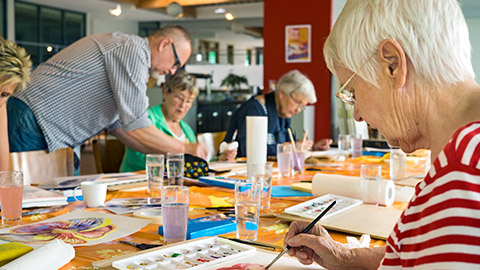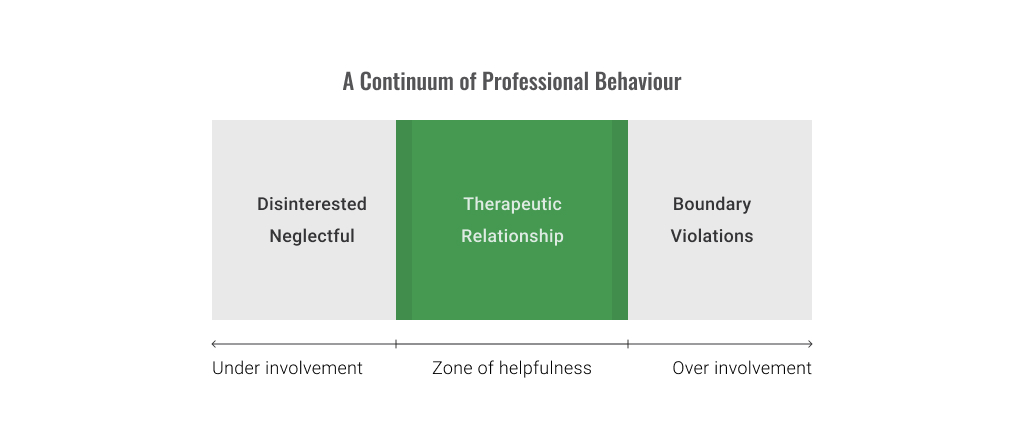When we think about collaboration, we think about individuals working together towards the same goal. For support workers caring for an individual with dementia, the goal is to provide quality, person-centred care as the disease progresses. This collaborative effort extends to supporting other members of the healthcare team and the individual's whānau (family).
An essential part of a support worker's role is to be able to collaborate effectively with other people and organisations to support tangata and their whānau.
Working well together is not just about getting along with others. It is a far more complex skill that requires you to practice the positive attributes of a team member.
Let's look closely at the descriptions of some of these attributes:
- Communicate constructively. When you collaborate with others your communication needs to be clear, direct, honest, positive and respectful.
- Listen actively. Listening by absorbing, understanding and thoughtfully considering the ideas and beliefs of others. Part of listening is the practice of receiving the information and taking an appropriate time to respond without getting defensive or reacting negatively.
- Be reliable. Keeping your commitments and doing your job to the best of your ability at all times.
- Be willing to share information, knowledge and experience. Being a good, objective source of information, and keeping the healthcare team updated with the latest information.
- Be discrete. A service user's medical information is confidential, and there is no exception. Discuss with Tangata, who you can relay and discuss information with to ensure the successful delivery of care and prevent unwanted surprises.
- Be an active participant. Engaging in discussions and meetings and taking initiatives to support the service user, their whānau and the healthcare team.
- Be cooperative. Look beyond individual differences to focus on what is best for the person being supported and solve problems or issues in positive ways.
- Be respectful. Consistently act according to your values, be courteous and considerate towards the service user, their whānau and the healthcare team.
Activity - Knowledge check

A multidisciplinary team in dementia care is a group of professionals from different backgrounds who collaborate to provide comprehensive care for people with dementia. Each team member has specific responsibilities that contribute to the overall goal of improving the quality of life for those with dementia. By combining their diverse expertise, the team can create customised strategies for each individual's needs. Their role is crucial in assessing, diagnosing, treating, and supporting dementia patients, with a focus on compassion and involving family members.
According to the New Zealand Ministry of Health Guidelines For People With Dementia " Comprehensive dementia assessment requires multidisciplinary input; medical assessment alone is seldom adequate. Other key personnel are specialist nurses, social workers and occupational therapists. Depending on the particular case, there is often a role for clinical psychology, physiotherapy and speech-language therapy.”
Reflection
Consider your current workplace and outline the various roles within a multidisciplinary team responsible for providing care to a dementia client.
Healthcare professional roles
| Geriatricians | Geriatricians are medical doctors who specialise in the care of older adults, including those with dementia. They diagnose and manage dementia, prescribe appropriate medications, and coordinate overall medical care. |
| Neuropsychologists | These professionals assess cognitive functioning and conduct neuropsychological evaluations to aid in diagnosing and monitoring dementia. They provide valuable insights into cognitive strengths and weaknesses. |
| Registered Nurses (RNs) | RNs play a crucial role in dementia care by providing direct nursing care, administering medications, monitoring health, and educating both patients and caregivers about dementia management. |
| Occupational Therapists (OTs) | OTs focus on enhancing individuals' ability to perform daily activities. They help people with dementia maintain their independence by providing strategies and interventions to manage daily living tasks. |
| Speech-Language Therapists | These therapists work with individuals who may experience communication difficulties due to dementia. They help improve speech and language skills, as well as address issues related to swallowing and nutrition. |
| Social Workers | Social workers assist individuals and families in navigating the emotional, social, and practical challenges associated with dementia. They provide support, connect families to resources, and assist with long-term care planning. |
| Physiotherapists | Physiotherapists help individuals with dementia maintain physical function and mobility. They develop exercise programs and strategies to prevent falls and improve overall well-being. |
| Dietitians | Dietitians assess nutritional needs and develop dietary plans tailored to individuals with dementia. They address issues like weight loss, malnutrition, and dietary preferences. |
| Pharmacists | Pharmacists collaborate with the team to manage medication regimens for individuals with dementia. They ensure the safe and appropriate use of medications and help minimise potential side effects. |
| Palliative Care Specialists | For individuals in advanced stages of dementia, palliative care specialists focus on providing comfort, pain management, and support for individuals and their families during end-of-life care. |
| Cultural Liaisons | Given New Zealand's diverse population, cultural liaisons help ensure that dementia care is culturally sensitive and respectful of the unique backgrounds and preferences of individuals and their families. |
| Care Plan Coordinator | Healthcare professionals are responsible for coordinating care plans for individuals with dementia. They gather input from various team members, which may include doctors, nurses, social workers, therapists, and family caregivers, to develop comprehensive care plans that address the medical, psychological, and social aspects of dementia care. |
| Education and Training Specialist | Professionals in this role provide ongoing education and training to team members. They ensure that the team is well-informed about best practices in dementia care, the latest research findings, and evidence-based interventions. This equips the team with the necessary skills and knowledge to deliver high-quality care and stay updated with advancements in the field. |
| Behavioural Management Expert | Dementia can lead to challenging behaviours, and healthcare professionals with expertise in behavioural management are crucial in the multidisciplinary team. They assess and develop strategies to manage behavioural changes effectively, creating a calm and safe environment for both the person with dementia and their caregivers. |
| Family and Caregiver Support Liaison | Professionals in this role focus on providing support to the family members and caregivers of individuals with dementia. They offer emotional support, information, and resources to help families cope with the challenges of caregiving. By recognizing and addressing the needs of caregivers, they contribute to the overall well-being and stability of the care environment. |
| Support workers | Support workers provide personal care, companionship, medication management, mobility assistance, meal preparation, environmental safety assessments, emotional support, monitoring and reporting, communication facilitation, cultural sensitivity, and collaboration with healthcare professionals to ensure holistic care for individuals with dementia. |
These healthcare professionals work collaboratively within a multidisciplinary team to address the complex needs of individuals with dementia and provide holistic care, considering medical, psychological, social, and cultural aspects of the condition.

Leaving the care of a loved one with dementia in the hands of others can be a challenging decision. As a support worker in aged care, you play a pivotal role in ensuring that individuals with dementia transition from home to residential care as smoothly as possible. Equally important is the involvement of the client's whānau. Family members provide familiarity, knowledge, and emotional support that can significantly enhance the well-being of a person with dementia.
As a support worker, here are some ways you can assist families in supporting their loved ones with dementia and demystify the condition:
- Provide them with informational resources about dementia, such as booklets and materials from reputable sources like Alzheimer's NZ (available at your local Alzheimer's organisation or www.alzheimers.org.nz).
- Explain that even though a person with dementia may appear fine on the outside, they are living with a condition that significantly impacts their daily life.
- Clarify that dementia is not contagious, emphasizing that it could affect anyone.
- Suggest to visitors that they plan shorter visits and avoid overwhelming the person with too many visitors at once.
- Encourage visitors to bring activities that the person with dementia can engage in, such as simple projects or puzzles, or propose outings together, like going for a leisurely walk.
Communication Tips for Family and Friends
Helping your loved ones understand how to interact with someone with dementia is crucial. Here are some effective communication tips:
- Recognise Abilities and Understanding: Assist family and friends in recognising what the person with dementia can still do and how much they can understand.
- Initiate Conversations Thoughtfully: Offer suggestions on how to begin conversations with the person. For example, encourage them to make eye contact and say, "Hello Samuel, I'm Joseph. We used to work together."
- Avoid Correcting Mistakes: Emphasise the importance of not correcting the person with Alzheimer's if they make a mistake or forget something. Instead, encourage family and friends to respond to the feelings expressed or shift the topic gently.
- Plan Enjoyable Activities: Help family and friends plan enjoyable activities with the person, such as family reunions or visits with old friends. Video calls can also be a great way to connect. When the person is bored or confused and needs distraction, viewing a photo album together can be helpful. Family and friends can even create care packages, make photo albums, or prepare videos to send to the person.
Remind them to:
- Call or video chat during times when the person with Alzheimer's is most alert and engaged.
- Maintain a calm and quiet demeanour; avoid using a loud voice or speaking to the person as if they were a child.
- Respect the person's personal space and avoid standing too close.
- Encourage a two-way conversation for as long as possible, being patient when the person struggles to find the right words or express their feelings. Offer assistance without speaking on their behalf.
- Not take it personally if the person does not remember them, behaves unkindly, or becomes upset. Such reactions often stem from confusion rather than intentional actions.
Talking about dementia with children and young people

Witnessing a loved one's struggle with dementia can be challenging for children, making it hard for them to comprehend the situation. Involving and communicating with children when caring for a person with dementia may be part of your role.
Reflection: Forum
Please share an experience from your work with dementia clients where you observed positive interactions between the elderly individual and their child's family members. Reflect on the specific strategies or approaches that were employed to create a meaningful and supportive connection between the two generations. How do these interactions contribute to the overall well-being of both the dementia client and the children involved?
Share any valuable insights or lessons learned from these experiences in the positive interactions forum thread.
Activity - Quiz
Take some time to read this article about how young people might respond when a person has dementia. Then, answer the following three true/ false questions.
Activity - Scenario
In an elderly care facility specialising in dementia care, Sarah, an experienced support worker, demonstrates effective ways to engage families with dementia care patients:
Scene: In the facility's communal area, Sarah notices Mr. Wetere’s daughter, Emma, sitting with her father, who has advanced dementia. Emma appears uncertain about how to connect with her father, who seems distant.
Sarah: (approaching Emma) "Hello, Emma. I see you're spending time with your dad today. It's good to have you here."
Emma: (with a hint of uncertainty) "Yes, I wanted to visit, but I'm not sure how to interact with him anymore. He's changed so much."
Sarah: (compassionate) "I understand, Emma. Let's try something together."
Sarah encourages Emma to sit beside her father, holding his hand and softly speaking about their shared memories, like their favourite memories on their marae. She also suggests showing him old photos of whānau to trigger recognition.
As Emma engages with her father, Sarah offers a cup of tea and a biscuit, creating a relaxed atmosphere. She then brings over a board game, subtly involving other family members visiting nearby.
Sarah: (whispering to Emma) "Familiar activities like sharing tea or playing games can help spark connections. It's about cherishing the moments."
As the visit unfolds, family members join in the game, and Emma's father becomes more engaged, occasionally sharing a smile or nod.

As support workers in aged care residential homes and specialised dementia care, your role is multifaceted, encompassing various aspects of caregiving. In addition to providing emotional and social support to residents, you'll also be responsible for performing clinical tasks. These clinical tasks are essential to ensure the well-being and overall health of residents living with dementia.
Let’s review some common clinical tasks that you may encounter as part of your role:
| Measures, records vital signs | Accurately measure and record patient vital signs, e.g. blood pressure, heart rate, respiratory rate, temperature. Notify and document abnormalities in patient’s vital signs promptly in accordance with procedures. |
| Personal cares | Carry out routine personal care and hygiene ensuring patient’s privacy and dignity are respected. |
| Supports patients with mobility | Assist with client mobility and movements using safe techniques to prevent injuries to clients and themselves. |
| Documenting patient information | Record relevant patient information accurately and in a timely manner using appropriate documentation methods. |
| Adheres to infection control protocols | Adhere to infection control protocols, e.g. use appropriate PPE, follow hand hygiene and infection prevention measures, maintain a clean and sanitary environment etc. |
| Responds to emergency situations | Recognises and responds appropriately to signs of distress in clients or promptly initiates responses for medical emergencies. |
| Communication and collaboration with multidiscipline teams. | Effectively communicating with healthcare professionals from various disciplines to provide comprehensive care and support to residents. |
| Wound care | Assist with wound dressing, maintaining skin integrity, and preventing pressure ulcers through repositioning. |
| Nutrition and hydration | Ensuring residents receive proper nutrition and hydration, including monitoring dietary restrictions and assisting with feeding when necessary. |
Reflection on clinical tasks in the workplace
As a support worker in dementia care, the reflection process allows you to gain a deeper understanding of your role and recognise the significant contribution you make to the provision of care.
Select three clinical tasks from the list above that you regularly perform in your role as a support worker.
Describe the clinical task and explain what the task entails, including the specific steps, protocols, and any safety measures involved. Be thorough in your description to ensure a clear understanding of the task.
Reflect on your contribution to the provision of this clinical task. Describe how your actions and responsibilities contribute to the overall care and well-being of the residents.
Consider the following points in your reflection:

Carrying out your everyday activities and clinical tasks within your limits of abilities and knowledge is crucial in a support worker role.
It is essential for several important reasons:
Overstepping these practices
While support workers are committed to their roles, it is crucial for them to understand and adhere to their professional boundaries, staying within their limits and following established procedures and policies.
Everyone in your team should know where their role in the workplace ends, and someone else’s begins. For example, your role is to support the person as described in your job description and their personal plan. Your supervisor also supports the person and has been trained to carry out different tasks. Therefore, they will have different boundaries from you, the support worker.
Zone of helpfulness
The 'zone of helpfulness' describes the range of care activities that should be carried out by a support worker. As a support worker, you need to avoid slipping out of the zone of helpfulness. An under-involved support worker could be disinterested or even neglectful, whereas being over-involved with the client or their whānau can put both the client and the support worker at risk.

Source:NCNZ Guidelines: Professional Boundaries (flippingbook.com)
Activity - Scenario
Read the scenario below and consider the implications of overstepping role boundaries and the effect on the client and collaboration of the health care team.
Scenario: Task Boundary Breach in Aged Care Dementia Care
In an aged care facility specialising in dementia care, a support worker named Mya had been working diligently for several months, providing compassionate care to residents with various stages of dementia. Mya was known for her empathy and dedication, and she formed strong bonds with many of the residents.
One afternoon, Mya was assigned to assist Mrs. Kumar, a resident with advanced dementia who had difficulty with mobility and was prone to sudden outbursts of agitation.
On this particular day, Mrs. Kumar was having an especially difficult time. She had become increasingly agitated, and aggressive and refused to eat her lunch. Mya, concerned for Mrs. Kumar's well-being and wanting to provide comfort, decided to go beyond her usual duties.
Due to the facility being understaffed and very busy on this particular day, instead of seeking assistance from the registered nurse, who was responsible for administering medications and addressing medical needs, Mya took it upon herself to administer a sedative medication from Mrs. Kumar's prescribed medications to calm her down. Mya had observed the nurse do this before and believed it would help in this situation.
Unbeknownst to Mya, this action had a significant impact on the multidisciplinary team:
Medical Team: Mya's unauthorized administration of medication was a breach of the facility's protocols and legal regulations. The medical team, led by Nurse Emily, was responsible for medication management. This unapproved action could have serious medical consequences, and it jeopardised the medical team's ability to track and manage Mrs. Kumar's medication accurately.
Nursing Team: Nurse Emily was not informed about Mya's intervention until after the medication was administered. This miscommunication caused confusion within the nursing team, as they were unsure about Mrs. Kumar's medication status, leading to potential errors in her overall care plan.
Administrative Consequences: Mya's breach of her role boundaries had significant administrative consequences. The facility's management had to conduct an internal investigation, report the incident to regulatory authorities, and address any potential legal ramifications. This placed an added burden on the administrative staff responsible for ensuring compliance with regulations.
In this scenario, Mya's well-intentioned but unauthorized action had a cascading effect on the entire multidisciplinary team. It underscored the importance of support workers staying within their designated roles and the critical need for effective communication and collaboration among healthcare professionals in dementia care settings. To prevent such situations, ongoing training, clear protocols, and communication channels must be established and followed diligently.
Reflection: Forum
Reflect on your current role in the workplace and the responsibilities assigned to you. Are there any instances where you've felt tempted to step outside your role boundaries, and if so, why? How do you think understanding and respecting these boundaries can contribute to a more effective and harmonious work environment?
Share your thoughts in the role boundaries forum thread.
